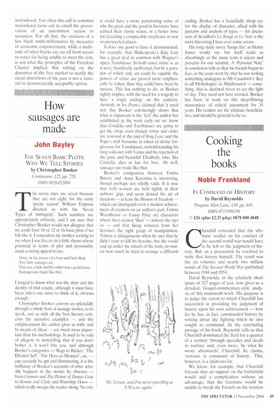How sausages are made
John Bayley
TIIE SEVEN BASIC PLOTS: WIIY WE TELL STORIES by Christopher Booker Continuum, 125, pp. 728, ISBN 0826452094 The seven stars are seven because they are not eight; for the same 'pretty reason' William Empson diverted us with his 'Seven Types of Ambiguity'. Such numbers are appropriately arbitrary, and I am sure that Christopher Booker would not disagree that we could have 10 or 12 or 16 basic plots if we felt like it. I remember my mother reciting to me when I was five or six a little rhyme whose potential in terms of plot and personality made a strong appeal to me:
Once, in the corner of a ham and beef shop, Two little sausages sat.
One was a lady and the other was a gentleman. Sausages are made like that.
I longed to know what was the story and the destiny of that couple, although it must have been, when one came to think of it, obvious enough.
Christopher Booker convoys us splendidly through a whole host of sausage stories, so to speak, and as with all the best literary criticism the narrative examples — and the enlightenment the author gives us with, and by means of, these — are much more important than his methodology. It used to be said of allegory in storytelling that if you don't bother it, it won't bite you, and although Booker's categories — 'Rags to Riches', 'The Divided Self, 'The Hero as Monster', etc. — can certainly be apt and illuminating, it is the brilliancy of Booker's accounts of what actually happens in the stories he chooses — from C.'annen and The Picture of Dorian Gray to Bonnie and Clyde and Waters/tip Down — which really sweeps the reader along. No crit
ic could have a more penetrating sense of why the great and the good in literature have earned their classic status, or a better nose for detecting a comparable excellence in new or unexpected places.
It does one good to have it demonstrated, for example, that Shakespeare's King Lear has a great deal in common with Wagner's opera Tannhauser. In both cases, virtue is, as it were, beatifically ineffectual, but by a paradox of which only art could be capable the powers of virtue are proved more emphatically by failure than they could have been by success. This has nothing to do, as Booker rightly implies, with the need for a tragedy to have a tragic ending: on the contrary, Aristotle in his Poetics claimed that it need not. But Booker convincingly shows that what is important is the leer the author has established in the work early on: we know that Cordelia and Tannhauser are going to get the chop, even though virtue and order are restored at the end of King Lear, and the Pope's staff blossoms in token of divine forgiveness for Tannhauser, notwithstanding his long walk-out with Venus and his rejection of the pure and beautiful Elizabeth, who, like Cordelia, dies at last for love. Ah well, sausages are made like that.
Booker's comparison between Emma Bovaiy and Anna Karenina is interesting, though perhaps not wholly valid. It is true that both women are held tightly in their authors' grip, and seem denied the air of freedom — at least the illusion of freedom — which can distinguish even a modest achievement of creation on an author's part. Emma Woodhouse or Fanny Price are characters whom their creator 'likes' — indeed she says so — and that liking removes from her heroines the tight grasp of manipulation. Tolstoy is disingenuous when he says that he didn't want to kill his heroine, but she would end up under the wheels of the train, no matter how much he tried to arrange a different ending. Booker has a beautifully sharp eye for the display of character, allied with his patterns and analysis of types — his discussion of Stendhal's Le Rouge et Le Noir is the most discerning I have ever come across.
His long study never 'hangs lire' as Henry James would say, but itself reads as absorbingly as the many texts it selects and presents for our scrutiny. A 'Personal Note' in conclusion tells us that his friends began to fear, as the years went by, that he was writing something analogous to Mr Casaubon's 'Key to all Mythologies' in Micldlemarch — something, that is, destined never to see the light of day. They need not have worried. Booker has been at work on this deep-flowing masterpiece of critical assessment for 34 years. His readers are the ultimate beneficiaries, and should be grateful to be so.


























































































 Previous page
Previous page